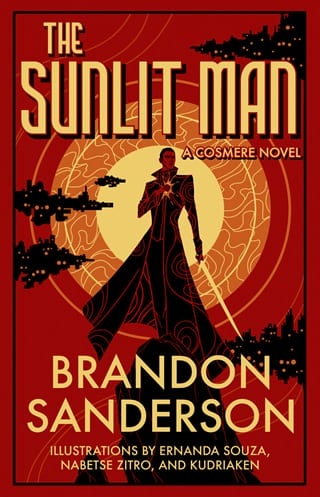Chapter Twenty-One
They gave him a little room near the center of the city. He found it…comfortably small. Like a workshop, with a wall for pinning notes above a utilitarian desk and a pull-out cot in the corner. Though hardly grand, there was a pleasant lived-in quality to the space that he liked.
They soon brought him a small engine, taken from one of the hovercycles, and placed it on the workbench. It was only the size of a large melon. After that, they brought Elegy, dragging her by her arms, which were chained together at the wrists.
He hadn't seen the Charred since helping "rescue" her during that initial escape. A group of six men worked to chain her to the wall as she struggled. He studied her in more detail, seated at his desk. She appeared to be in her late thirties. There was one ember mark glowing on her left cheek, and her silvery black hair was cut short. Like her sister, she had light green eyes, and she gave him plenty of opportunities to see them as she raged against her captors.
The men finally left, several nursing wounds from being kneed or elbowed. Even in chains, this woman was dangerous. Her ember—glowing from the ashen cavity of her chest, where her heart should have been—flared dramatically as she fought against the chains. If she hadn't been so Invested—the power reinforcing her very skin and muscles—she would have injured herself in her furious attempts to rip free.
"This was her room, once," Contemplation said from the doorway. "I had hoped it might spark some kind of memory…"
From the way Elegy resisted, he doubted it was doing anything. Still, the fact that it had been her place indicated he'd have liked this woman, had she not been burned until only the ashes of her soul remained.
"Why do you want her?" Contemplation asked.
"I need to understand your power sources," Nomad said. "These sunhearts…they aren't quite like anything I've seen on any other planet." He nodded to Elegy. "She has one right in her core. I want to run a few tests."
"Will they hurt her?"
"I can't promise either way," he said. "But I don't expect them to."
Contemplation nodded thoughtfully, her dark hair smoothed into a beehive, making her seem taller than she was. "There are those among us," she finally said, "who will be mightily upset with you if anything unfortunate happens to Elegy."
He nodded. "You're not one of those, though?"
"I knew Elegy well," Contemplation said. "I spoke for her many times during the months she encouraged our rebellion. Once I was named to the Greater Good, I voted to name her to the position of Lodestar. An appointed position, the one who navigates a city along its route. For us, it was more than just that—it was a person to offer plans. We are the city's leaders, but she was its heart. We followed her vision." She nodded toward the woman chained to the wall. "That thing isn't Elegy. You can't hurt her, Sunlit. She's already dead."
Then Contemplation stepped toward him, removed the glove from her hand, and held it up, palm forward. She seemed to expect something from him. Hesitant, he put his hand up before hers—but did not touch.
"You draw nothing?" she said.
"I'm led to believe," he said, "that it's not good etiquette to take heat from others."
"Unless it's offered," Contemplation said, nodding to her hand. "This is an act of thanks for us, Sunlit. A display of vulnerability and willingness to trust. You saved my life, through great pain and risk. Thank you."
So with that explanation, he pressed his palm to hers. "Your Breath become mine," he whispered, trying a Command to see if he could draw out her heat. It didn't work, of course. But it had been worth a shot, and besides, the ceremony meant something to her.
She grew teary-eyed. "When you burst through that window," she said, "I knew you were him. A Sunlit Man of the stories. I knew it again when you offered us hope to continue our eternal pilgrimage."
"I'm not what you think, Contemplation," he said. "I'm really not. But right now, if it will keep you all moving, then you can call me whatever you storming want."
The elderly woman smiled. "I'm pleased I got to see you." She retreated then, leaving him alone with a glowing madwoman. Well, that and his semifunctional conscience.
Do you really think you can do this? the hero asks, dubious but curious.
Nomad settled down at the desk, but continued watching Elegy, who had stopped thrashing and instead devoted herself to glaring at him. "I think," he said to Auxiliary, "that I don't have any other options. Fortunately they have the difficult part solved."
They do?
He opened a blank notebook. "Sure. They have a compact, powerful, renewable energy source. Something most developing societies can only dream about. That's difficult. Travel has always been about the power supply. Creating energy—well, releasing it—is easy. Just throw a match into a pile of dried-out wood and you'll see that. But harnessing it? Making it portable? That's the problem."
If it's so easy, Auxiliary replied as Nomad started writing and sketching, then what happens when they get into those mountains? Why do their engines stop working?
"The engines don't stop working," he said. "They keep right on releasing energy, but there's nothing for them to do with it. Most conventional travel involves one basic principle: equal and opposite reactions. From jet engines to horse-drawn carriages, it's all about the primary laws of motion."
And a jet engine needs air to provide thrust?
"Yes," he said. "It's more complicated, but in general, a jet engine works by forcing air through a small nozzle. In most cases, it's superheated air that has passed through a turbine, and the resulting thrust is what moves the ship. Air shooting out the back of the engine."
So…no more air…no more thrust?
"Exactly," he said, pointing at the small engine. "I suspect these sides here are air intakes. They draw in a great deal of it, then the sunheart superheats it in this structure here—some kind of compressor—maybe even generates plasma, which would be wild. Look at this. See these nozzles in here? That's where the superheated air—and perhaps even some Investiture turned to raw energy—bursts out. That gives us the lift and the fiery glow we see."
And what about space flight, where there is no air? How do other ships do it?
That was still relatively new. Well, the science was old, depending on which parts of the cosmere you visited. But few had ever experimented with it until the last hundred years or so. Why take all the effort to travel the void of space when there were easier ways to travel between planets?
Trick was, most of those were slow, usually involving months or even years of walking through another dimension. You could fly there too, but could only get out at specific points. Faster methods that could go anywhere were just starting to be explored, but they were proportionally more difficult in their own ways. Either that, or they had some storming terrible side effects. His own experience proved that.
Even so, more and more people in the cosmere inched toward understanding the difficult, but plausible, methods that had been out of reach until scientific practicality matched theoretical dreaming.
"For space flight," he said to Aux's question, "you usually bring your own propellant. A rocket engine will often mix a fuel and an oxidizer—but the point is that the mass of those two is ejected from the back of the engine at high speed. Mass and energy expelled out the back makes you go forward. These sunheart-powered engines don't carry fuel with them."
So we do that.
"How much liquid oxygen you got handy?" he asked. "How about kerosene? Rocket fuel is not common stuff, Aux. I doubt we could put anything together in time, and I know of no sources of zephyr aether on this planet. Do you?"
Then…we're ruined?
"No," he said, beginning work on a diagram. "They've got plenty of one thing: water. It's pounding on the rooftop right now. Plus they have, as I said, the hard part in hand: supercompact, energy-rich fuel. It can heat things without needing oxygen. So if we get a boiler working and steam jets coming out the bottom…"
Wait. You're going to power space flight with a steam engine?
"I guess I am," he said. "Though I'd call it high-atmosphere flight rather than proper space flight. Anyway, you'd be surprised how many modern sources of energy rely on the same principle. The problem with traditional steam engines—well, one of the big ones—has always been the fact that the fuel is outrageously bulky and heavy. Not practical for much beyond a large-scale engine on rails with a lot of towing capacity. I'm telling you, though, this is how all motion works."
All motion? the knight asks hesitantly. What about when we'd fly together in the past?
Nomad froze. That had been different. He'd misspoken, of course. Not all motion was due to the factors he'd indicated. There were other kinds, like fundamental laws of attraction. One body to another. Forces that held all matter together, at the level of the axon.
"That was different," he admitted.
I used to love that, Aux said. Before…
Nomad breathed out heavily, squeezing his eyes shut.
It wasn't your fault.
"I said yes to Hoid. And I bonded you."
You didn't know what either would do.
"I let the Dawnshard consume us, Auxiliary. I let it feed on you."
I salvaged a little. This bit of my mind. The last fragment of my soul.
Wit's fault as much as it was Nomad's. Done ostensibly to protect the cosmere. Wit had asked him to carry something known as a Dawnshard, a well of unimaginable Investiture designed as a weapon.
Nomad didn't know the specifics. Only that the result of trying to help was a dead friend—reduced to a voice in his head—and entire armies trying to hunt him. He'd accepted that terrible weapon to hide it, and that power had warped his soul. Worse, he hadn't known, hadn't realized, that bonding Auxiliary would lead to such a tragedy.
They'd spent years together with the potential lurking there, unseen. Then, in a moment of need, he'd unconsciously reached out for any energy source he could access. The Dawnshard had found Auxiliary, a being of Investiture.
It had turned Aux's very substance into power to fuel Nomad's abilities.
The Dawnshard—the weapon—protected itself. No matter what. No matter who it killed. Nomad had barely been able to stop himself before burning the entirety of Auxiliary's soul away in a moment of supercharged power.
This is not the time for regret, the knight chides softly. You have some very large problems to solve.
He was right. Nomad opened his eyes and fished in his pocket, bringing out the drained sunheart that had been left after he'd ingested the Investiture. It felt like glass in his fingers—a small cylindrical lump of smokestone eight inches tall and a few in diameter. The surface was marked with ridges and a kind of grain, like melted wax. It was random, of course, but he could swear that one section looked like a screaming face…
Rebeke said this thing had been able to power a ship for months. That kind of power wasn't part of most souls, not even Threnodite souls. Something else was happening. Power was being drawn from another place, with the soul acting as a kind of seed or starter. But why had the Rosharan sunheart the Cinder King showed him been so small? Why hadn't it acted as a similar seed?
He stared at the notebooks and felt a building dread. This was the sort of thing he'd run from, even before the chase truly began. Failures that wrapped his heart like barbed wire, stretching back to his childhood. But it was either this or go crawling to the Cinder King and take his offer of employment. Nomad intended to consider that only if the Night Brigade itself were at the door. So he accepted his lot.
And started drawing up schematics.
 Fullepub
Fullepub 



